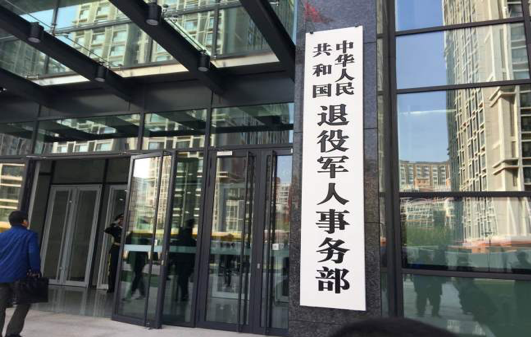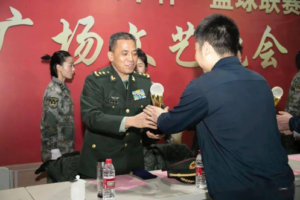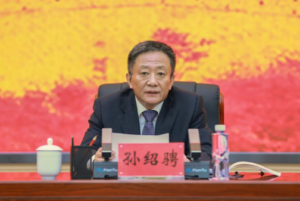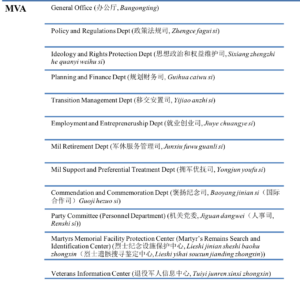
All Eyes on the Ministry of Veterans Affairs
Publication: China Brief Volume: 22 Issue: 5
By:

Introduction
On March 19, 2018, the 13th National People’s Congress (NPC) ratified the establishment of the Ministry of Veterans Affairs (MVA) (中华人民共和国退役军人事务部, Zhonghua renmiin gongheguo tuiyi junren shiwu bu) as an element of the State Council Organization Reform Plan (国务院机构改革方案, Guowuyuan jigou gaige fang’an) (PRC State Council, March 17, 2018). The MVA officially opened a month later with Sun Shaocheng (孙绍骋) appointed as its inaugural minister (Xinhua, July 31, 2018). On January 1, 2021, China’s first Veterans Support Law of the People’s Republic of China (PRC) (中华人民共和国退役军人保障法, Zhonghua renmin gongheguo tuiyi junren baozhang fa) came into effect (China Military Online, November 27, 2020). While western observers widely believed that the MVA was created in response to a series of veteran protests prior to 2018, its broader administrative and political functions are not sufficiently understood. [1] This article serves as a primer on the MVA’s organization and mandate, provides a preliminary assessment on its performance over the past four years, and analyzes future trends of its development.
Under Title 38 of the United States Code (Veterans’ Benefits), a veteran is defined as a “person who served in the active military, naval, air, or space service, and who was discharged or released therefrom under conditions other than dishonorable” (Law for Veterans, December 1, 2021). The Chinese equivalent of a “veteran” directly translates as “demobilized military service member” (退役军人, tuiyi junren), and carries almost an identical definition as the U.S. term. [2] However, while the U.S. government has a long history of managing veteran affairs tracing back to the 1776 Continental Congress that has continued through each subsequent conflict, the management of “veterans affairs” is a somewhat novel concept for the Chinese Communist Party (CCP) (VA History Office, Updated May 21, 2021). The U.S. Veterans Administration, created in 1930, became the cabinet-level Department of Veterans Affairs in 1989. Since the People’s Republic of China (PRC) was established in 1949, the state has largely relied on non-legally binding orders to local governments to provide basic welfare to its veterans.
The MVA’s mandate is to provide a “centralized and unified” (集中统一, Jizhong Tongyi) management and support system for 57 million People’s Liberation Army (PLA) veterans, including those who served in the Red Army prior to 1949 (PRC MVA). The MVA seeks to “protect and advance the legitimate rights and interests of military personnel and their families, improve the service and management system of demobilized military personnel, and make military service an occupation that enjoys public respect” (State Council, March 13, 2018). It has since consolidated responsibilities previously dispersed in the Ministry of Civil Affairs and the Ministry of Human Resources and Social Security, as well as the Central Military Commission’s (CMC) Political Work Department (PWD) and Logistic Support Department. According to Vice Premier Sun Chunlan (孙春兰), the sole female member of the politburo who serves as the top CCP supervisor of MVA work, the MVA is as much about taking care of veterans as motivating more young talent to join the PLA (State Council, April 18, 2018).
Despite initial fanfare, the newest addition to China’s massive state bureaucracy is treated differently from other ministries. Almost all of China’s ministries under the State Council are located in Xicheng or Dongcheng Districts in central Beijing, yet the MVA was placed in Chaoyang District, outside the fifth ring road of the city (PRC Ministry of Foreign Affairs, September 24, 2005; MVA). This may be a deliberate decision to help direct future mass protests away from the city center and politically-sensitive city landmarks—out of the public scrutiny.
Furthermore, the MVA was not made completely independent from the CMC’s PWD at its establishment. Major General Fang Yongxiang (方永祥) was appointed as a uniformed vice minister of the MVA while being dual-hatted as an Assistant to the Director of the CMC’s PWD, suggesting the PLA’s continued involvement in the management of veteran affairs (State Council Information Office, July 31, 2018). Fang was promoted to a Lieutenant General in December 2021 to serve as the political commissar of the Southern Theater Command Army, and is no longer listed on the leadership page of the MVA (Taihainet, January 6). A native of Xiamen, Fang has deep ties to the 31st Group Army, a unit that focuses on a Taiwan contingency and produced a large number of top military leaders under President and CMC chairman Xi Jinping (Xinhua, April 28, 2017; U.S.-China Economic and Security Review Commission, January 27). Fang likely served in a transitional role to ensure the MVA’s launch was successful, although it remains unclear if such a dual-appointment arrangement will continue following his departure. This dual-appointment arrangement appears to be continued. On March 11, Major General Yang Youbin (杨友斌) reportedly has been appointed as Fang’s replacement (Caixin, March 11, 2022).

Figure 1: Fang Yongxiang has been promoted to Lieutenant General as of January 2022 (source: Sohu)
Sun Shaocheng currently serves as the Minister of the MVA. Sun is a career politician, who previously served as a Vice Governor of Shandong (2012) and Shanxi (2016). Prior to the MVA, he also served for 25 years in the Ministry of Civil Affairs, including as a Vice Minister (2017) (China Vitae). As of 2022, the MVA has three Vice Ministers: Qian Feng (钱锋), Chang Zhengguo (常正国), and Ma Feixiong (马飞雄), none of whom served in the military. [3]

Figure 2: Sun Shaocheng in 2022 (source:MVA)
The MVA consists of a general office, eight functional departments, two information centers, and an office for party committee affairs/personnel department (MVA) (See organizational chart below). It works closely with provincial, city, and county level veterans affairs administrations to provide services to demobilized service members. Each Chinese province and municipality now has its own VA known as either a VA bureau (局, ju), e.g. Beijing Municipal VA Bureau (北京市退役军人事务局, Beijing shi tuiyi junren shiwu ju), or department (厅, ting), e.g. VA Department of Zhejiang Province (浙江省退役军人事务厅, Zhejiang sheng tuiyi junren shiwu ting) (Beijing Municipal VA Bureau; Zhejiang Provincial VA Department). Local VA organizations play a key role in providing assistance to PLA conscripts who have recently completed their two-year enlistment periods (Chengyang.gov.cn, December 11, 2020).

Assessment
Veteran affairs management is a politically sensitive issue to any military. This is particularly true for China as President Xi Jinping advances his signature “building a strong military” agenda. The MVA’s key mandate to make the military a respectable profession directly links to this official narrative. More specifically, the MVA has focused on two key areas over the past four years: improving the veteran support system, including pension, healthcare, and career transition services, along with complaint management services, and increasing supervision and coordination of local VA service agencies to execute commendation and commemoration activities.
Support System
As a critical component of the CCP’s overall effort to boost the military’s social standing, the PLA has significantly increased the pay and benefits for active-duty personnel since the major organizational reform started in 2015-16 (China Aerospace Studies Institute, August 10, 2018). Yet the veteran’s pension and benefits, historically managed and funded by local governments with ambivalent central government support, appear to have lagged behind. The pension gap between service members who separated from the military before and after the reform has likely increased, as the PLA pension level is partly decided by active-duty base pay. Xi’s sweeping military reform also resulted in the downsizing of military personnel by 300,000 people (50 percent officers and 50 percent enlisted personnel), which only exacerbated pressure over the VA pension system (State Council, October 9, 2015). Thousands of veterans organized a quiet sit-in outside the headquarters of the CCP anti-corruption watchdog, the Central Commission for Discipline Inspection in October 2016. This was followed by hundreds of veterans staging two days of demonstrations in February 2017 outside the Commission’s headquarters, demanding unpaid retirement benefits.
Addressing the issue of Veterans’ benefits was clearly the top priority during the MVA’s initial years. Since 2018, the MVA has worked with several central government departments and military authorities to respond to specific requests from veterans. It has offered central government subsidies to help local governments cover retroactive basic and certain occupational pensions from October 2014 (State Council, October 9, 2015). The MVA also signed contracts with ten state-owned banks to offer preferential loans, fee reductions, and exclusive bank card services for veterans (Beijing Review, March 22, 2019). A “petition management mechanism” to direct veterans to petition for their rights “rationally and moderately” was also moderated (Reuters, July 31, 2018). Before the MVA suspended its in-person grievance management service in January 2020 due to the pandemic, it reportedly had successfully resolved more than 168,000 cases via both online and in-person services by June 2019 (National Public Complaints and Proposals Administration, August 8. 2019). Finally, since the CMC transferred all PLA retirement homes (干休所, Gan xiu suo) to provincial Military Districts at the end of 2017, the MVA’s Military Retirement Management Department continued to work with local VA authorities to ensure smooth transitions (Renmin Net,cn, May 27, 2018; MVA).
Commendation and Commemoration
Another key line of effort for the MVA is to advance the commendation and commemoration mechanisms to help improve the social standing of veterans in Chinese society. In addition to the Veteran Support Law, the NPC also wrote and passed the Hero and Martyr Protection Law (英雄烈士保护法, Yingxiong lieshi baohu fa) in 2018, which dedicated September 30 as China’s Memorial Day (MVA, April 27, 2018). It was followed by the State Council’s issuance of the Regulation on Martyr Commendations (烈士褒扬条例, Lieshi baoyang tiaoli) in 2019 (MVA, August 9, 2019). Unlike the United States, which has been involved in continuous wars over the past two decades and endured actual combat casualties, China’s modern martyrs are largely man-made heroes who died undertaking law enforcement, peacekeeping, disaster relief, and weapon research and testing activities (chinamartyrs.gov.cn; MVA, August 9, 2019). The commendation and commemoration work is closely linked to the CCP’s patriotic education and historic narrative building to justify its legitimacy. Notably, the MVA, in collaboration with 12 other government agencies, including the CCP’s Central Political and Legal Work Commission, the Central Propaganda Department, and the Supreme People’s Procuratorate, developed a joint action mechanism to prosecute violations of martyr protection laws and regulations (MVA, September 29, 2021).
One of the most notable activities implemented by the MVA’s Commendation and Commemoration Department, also known as the “International Cooperation” Department, is its effort in facilitating the highly-publicized repatriation of the remains of Chinese soldiers who died during the Korean War (Xinhua, September 27, 2020). As other scholars have pointed out, the “politics of bones” certainly serves as a useful propaganda opportunity to appeal to veterans and to boost military morale and nationalistic support for the CCP (Xinhua, October 14, 2019). [4] In 2019, the MVA, with the technical support of the PLA’s Academy of Military Medicine Sciences (军事医学院, Junshi yixueyuan), established China’s first DNA database for Korean war dead soldiers (Xinhua, October 14, 2019). In 2020, the MVA subsequently created a Martyr Commemoration Facility Protection Center (Remains Search and Identification Center), possibly modeled after the U.S. military’s Defense POW/MIA Accounting Agency (MOD, October 21, 2021; DPAA.mil).
Conclusion
The significance of the MVA cannot be overstated. Xi Jinping has highlighted his own identity as a “demobilized cadre” (军转干部, jun zhuan ganbu) on various occasions, and has provided consistent support for China’s VA work (CPC News, May 30, 2014; CCTV, July 26, 2019). Judging from the absence of large scale protests since the establishment of the MVA, the financial, legal, and ideological means the MVA has employed to advance veteran’s rights and social standing have been largely effective. Over the four years since it opened for business, its bureaucratic outreach has expanded and it has evolved from an agency to respond to veteran protests to become an effective executor of the CCP’s propaganda agenda. The PLA watching community should continue monitoring the various initiatives and programs undertaken by the MVA.
Kenneth W. Allen is a retired U.S. Air Force officer, whose extensive service abroad includes a tour in China as the Assistant Air Attaché. He was the former research director of U.S. Air Force’s China Aerospace Studies Institute (CASI).
Marcus Clay is an analyst with CASI. Any views expressed are those of the author, and do not reflect the official policy or position of the U.S. Air Force, Department of Defense, or other agencies of the U.S. Government.
Notes
[1] For an excellent study on the impact of PLA reform and downsizing and its implications for social stability, see Ma Chengkun and John Chen, “Chapter 17: System Overload, The 2015 PLA Force Reduction, Military-Locality Relations,” NDU Press, 2018, https://ndupress.ndu.edu/Portals/68/Documents/Books/Chairman-Xi/Chairman-Xi_Chapter-17.pdf?ver=2019-02-08-112005-803. For specific discussion about veteran protests and MVA, see: Eugene K. Chow, “How Chinese Veterans Could Derail President Xi’s Plans,” The Diplomat, May 1, 2018, https://thediplomat.com/2018/05/how-chinese-veterans-could-derail-president-xis-plans/.
[2] For a detailed explanation of Chinese terms associated with veteran and other personnel issues, see: Marcus Clay, The “People” of the PLA, China Aerospace Studies Institute (CASI), August 10, 2018. pp.11-13. https://www.airuniversity.af.edu/Portals/10/CASI/Books/Understanding_the_People_of_the_PLA.pdf
[3] Fang Yongxiang became one of the Vice Ministers in March 2018, but he also served concurrently as an Assistant to the Director of the CMC Political Work Department at the same time. He previously served as the Political Commissar for the Central Theater Command Army’s 81st Group Army in Zhangjiakou, Hebei Province. In December 2021, he became the Political Commissar for the Southern Theater Command Army and a concurrent Deputy Political Commissar for the Southern Theater Command.
[4] Sungmin Cho and Jennie Jin, “The Politics of Bones: The Political Motives behind the Repatriation of Remains of Chinese Soldiers Killed in the Korean War,” The China Journal, Volume 87, January 2022.




